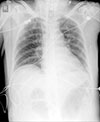Abstract
Anaphylaxis during anesthesia is rare, but often fatal. Rocuronium is a neuromuscular relaxant used for induction of anesthesia. We experienced a case of anaphylaxis after rocuronium administration during induction of anesthesia. A 64-year-old female patient was scheduled for bilateral radius fracture fixation. The history of patient showed no specific findings other than hypersensitivity to mackerel. She had no previous experience of anesthesia. Anesthesia was induced by intravenous injection of propofol 100 mg and continuous infusion was begun with remifentanil 0.25 µg/kg/min, followed by rocuronium 40 mg. Immediately after intravenous administration of rocuronium, the manual ventilation became difficult, and the patient developed erythema and severe hypotension. The patient was diagnosed with anaphylaxis based on clinical features and started treatment. First, we performed endotracheal intubation promptly. Then, immediate intravenous administration of epinephrine and fluid followed. Despite adequate treatment, hypotension was not corrected and intravenous epinephrine was administered. However, ventricular tachycardia occurred which was successfully treated with a defibrillator. Later, the patient uneventfully recovered in the intensive care unit. The patient was not tested for skin prick test, but rocuronium was the most likely cause of anaphylaxis at that time. The authors unexpectedly experienced drug-induced anaphylaxis, which is life-threatening to the patient. Clinicians should be aware of the diagnosis, treatment, and prevention as anaphylaxis can be hazardous to the patient.
References
1. Dewachter P, Mouton-Faivre C, Emala CW. Anaphylaxis and anesthesia: controversies and new insights. Anesthesiology. 2009; 111:1141–1150.
2. Levy JH, Davis GK, Duggan J, Szlam F. Determination of the hemodynamics and histamine release of rocuronium (Org 9426) when administered in increased doses under N2O/O2-sufentanil anesthesia. Anesth Analg. 1994; 78:318–321.

3. Muraro A, Roberts G, Worm M, Bil MB, Brockow K, FernFernK Rivas M, et al. Anaphylaxis: guidelines from the European Academy of Allergy and Clinical Immunology. Allergy. 2014; 69:1026–1045.

4. Hwang SM, Suh JW, Lim SY. Anaphylaxis after thiopental and rocuronium induction: a case report. Korean J Anesthesiol. 2005; 48:95–98.

5. Lee HM, Song SO. Anaphylaxis after injection of rocuronium: a case report. Korean J Anesthesiol. 2006; 51:101–104.

6. Cho YW, Park SH, Jeong JG, Kim KI, Son HW. Anaphylaxis induced by priming dose of rocuronium during induction of anesthesia: report of two cases. Anesth Pain Med. 2012; 7:352–354.
7. Kang DY, Lee J, Sohn KH, Kang SY, Cho YS, Kang HR. A case series of eperisone-induced immediate hypersensitivity. Allergy Asthma Respir Dis. 2017; 5:228–231.

8. Fasting S, Gisvold SE. Serious intraoperative problems: a five-year review of 83,844 anesthetics. Can J Anaesth. 2002; 49:545–553.
9. Mertes PM, Laxenaire MC, Alla F. Groupe d'Etudes des Rdes Res Anaphylactoo RR Peranesthhoo RR. Anaphylactic and anaphylactoid reactions occurring during anesthesia in France in 1999-2000. Anesthesiology. 2003; 99:536–545.

10. Yoon CS, Kim TY, Baek S, Ha SH, Lee JH. Allergic reaction after the insertion of a latex urethral catheter: a case report. Korean J Anesthesiol. 2004; 47:139–141.

11. Lee MJ, Do SH, Na HS, Kim MH, Jeon YT, Hwang JW. Anaphylaxis caused by latex surgical gloves immediately after starting surgery: a case report. Korean J Anesthesiol. 2010; 59:Suppl. S99–102.

13. Harper NJ, Dixon T, Dugue P, Edgar DM, Fay A, Gooi HC, et al. Suspected anaphylactic reactions associated with anaesthesia. Anaesthesia. 2009; 64:199–211.

14. Heier T, Guttormsen AB. Anaphylactic reactions during induction of anaesthesia using rocuronium for muscle relaxation: a report including 3 cases. Acta Anaesthesiol Scand. 2000; 44:775–781.

15. Campbell RL. Cardiovascular effects of epinephrine overdose: case report. Anesth Prog. 1977; 24:190–193.
16. Fisher MM, Munro I. Life-threatening anaphylactoid reactions to muscle relaxants. Anesth Analg. 1983; 62:559–564.

17. Mertes PM, Laxenaire MC. Allergy and anaphylaxis in anaesthesia. Minerva Anestesiol. 2004; 70:285–291.
18. Scheller MS, Zornow MH, Saidman LJ. Tracheal intubation without the use of muscle relaxants: a technique using propofol and varying doses of alfentanil. Anesth Analg. 1992; 75:788–793.




 PDF
PDF ePub
ePub Citation
Citation Print
Print




 XML Download
XML Download